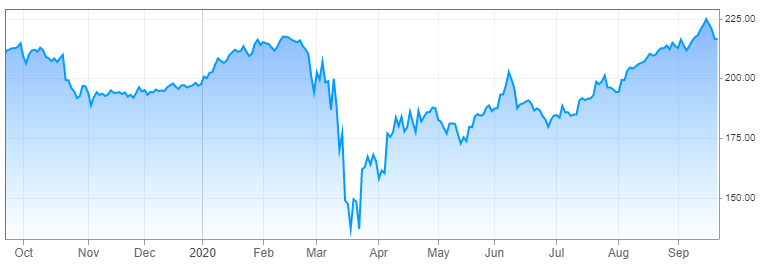Table of content
One of the most important factors for succeeding in the stock market is to choose a good brokerage company. All those brokers have different commission structures and quality of service. Consequently, it goes without saying that this can have a major impact on the investor’s future earnings.
When choosing a stock broker, the first thing many experienced investors look at is the list of regulators of the brokerage firm, as well as the customer reviews. If the market participants choose the broker which is regulated by the top tier regulators and has a good reputation, it is likely that they will not face any unfair treatment. Even if this happens, they always have an option to appeal their case to those regulatory bodies.
Another important factor for choosing a stockbroker is the commission structure. Nearly every broker charges a specific rate of commission for every trade. However, the exact amount of those fees vary greatly across the board. Consequently, by choosing a stock market broker which has low commission rates, investors can save a significant amount of money over the years.
The so-called custody fees are yet another major consideration when choosing the brokerage firm to invest with. This type of fee is usually expressed as a percentage of the assets the client owns and has a minimum amount. It goes without saying that this type of commission is very unpopular for many investors because it effectively reduces the amount of returns one earns from investing. Luckily there are some brokers who do not have those types of charges.
Finally, when looking for the best stock broker, one might consider how many international stock exchanges do the individual brokerage company has access to. It is also worth enquiring whether the broker in question allows its clients to invest in bonds and mutual funds. Obviously, everything else being equal, it is better to find a brokerage firm which offers access to dozens of different exchanges and allows its clients to invest in above mentioned securities.
Regulators and Reputation
One of the most important things for selecting the best online stock broker is to make sure that the firm is honest, is properly regulated and has a decent reputation. This is because, if this is not the case, then investors are risking to lose all of their money for no good reason. Even if the brokerage firm offers some of the lowest commission rates it does not guarantee that the firm will honor those promises.
On the other hand, when the company is regulated by top tier regulators, it has to comply with many regulations which are designed to protect clients’ interests. Some of those top tier regulators are located in such countries as the United States, United Kingdom, Australia, Germany, and Cyprus.

Another major benefit of choosing a properly regulated brokerage firm is that if clients ever feel that they have been mistreated by those companies they always have an opportunity to appeal their case directly to those regulators. As a result, if the regulators decide that indeed those people were treated unfairly, then they will get refunds from these brokerage companies.
In addition to taking a look at the list of regulators, the market participants can also go through the customer reviews of the individual brokerage companies. Here investors can pay attention to such details as the overall ranking of the firm in terms of the customer satisfaction, while also taking note of the advantages and disadvantages of the broker.
It goes without saying that, if the company has a poor rating and many negative reviews, then there might be a good reason for it to have such a poor reputation. So even if this type of broker has some of the best commission rates to offer, it might not be a good idea to open an account with them, since this might be something that one can regret later.
On the other hand, if the individual brokerage company has a high rating with lots of positive reviews, then it might be a sign that the majority of the clients are happy with the quality of service produced by the broker.
It is also true that in some cases, the individual brokerage firm might have mixed reviews with an average overall rating. In this case, it might be a good idea to take a look at what are the most common reasons for customer complaints. If those reasons are not very important for the individual then the investor might still consider opening an account with that specific brokerage company. On the other hand, if those complaints turn out to be a major source of concern for the investor, then it might be a good idea to move on and explore some other options.
Commission Rates
When selecting the online brokerage firm, one of the most important things to consider is the commission structure. The fact of the matter is that when it comes to brokers some type of commissions is simply unavoidable. After all, the brokerage firms are not non-profit organizations. They do have to generate revenues to pay the salaries of their employees, as well as cover other operating expenses and also deliver dividends to shareholders.
Many brokerage companies charge a flat fee per trade. The exact amount of this fee varies from broker to broker. For example, some firms might charge $15 per trade, while others might settle for $10. Now, the $15 flat fee for each trade might be a good option for those traders who are executing large transactions, worth thousands of dollars.
However, this might not be the best option for small investors. For example, if an individual only manages to invest $100 per month, paying 15% of this investment on commissions can be very problematic and most likely unacceptable for those individuals.
There are obviously two ways to reduce one’s expenditure on commissions. Firstly, one can find a stock market broker which has lower commissions compared to the overall average. So, for example, if one can find a firm which only charges $7 per trade, then compared to the one which has a $15 fee, the investor can save $8 per trade. This might be a relatively small amount for some people. However, the fact of the matter is that over time this difference can add up to a significant amount. For example, if in this case if traders execute 100 trades, then the amount of savings will be $800.
There is also another way to save money on commissions. Some brokerage firms offer a regular investment option to their clients. This means that the client has to authorize a regular monthly purchase of one or several stocks, with the specific minimum amount. With many brokers, this minimum investment with regular investing is either $50 or $100.
The brokerage firm then pulls all of those buy orders together from all of its clients and purchases those shares in bulk. Since those stocks are bought in one large transaction, this allows the firm to save money on commissions. Consequently, the broker passes some of those savings to the customers. With regular investment options, the market participants can purchase the stock from $1 to $5 with most brokers, saving a significant amount of money on commissions.
Therefore, when choosing the stock broker companies, it is helpful to find the one which offers the regular investment option. It allows the market participants to save money on commissions and also helps them to build a habit of investing on a regular basis.
Dollar Cost Averaging Strategy
Actually, regular investing has a third major benefit as well. This is exactly where the dollar cost averaging comes into play. What happens here is that when investors invest the same amount of money over the months, the average price of the purchase tends to go down. In order to illustrate this point better, let us take a look at this chart, which depicts the McDonald’s stock price for the last 12 months:

source: cnbc.com
As we can see from the above graph, the stock was trading near $209 level by the end of September 2019. During the subsequent months, the shares faced a major correction, dropping down to $195 mark. This decline was followed by the recovery at the beginning of the year. However, this turned out to be unsustainable. After all, the outbreak of the COVID-19 pandemic and subsequent imposition of lockdowns across the globe has created a major financial headwind for the company.
As a result of those problems, by the middle of March 2020, the stock has dropped all the way down to $137 level. However, this was followed by an extended period of recovery. As a result of this development, by June 2020 the stock already returned to $190, while in September the shares have reached a peak of $225.
Now, here it is important to point out that what a dollar cost averaging does is that investors using this method will buy more shares when the prices are low and buy fewer shares when the market price is high.
To understand this phenomenon better, let us take an example. Let us suppose that an investor decides to follow the dollar cost averaging strategy and invest $3,000 during every month or quarter. So when the prices were low in March 2020, when the stock traded at $137, then this individual would have been able to purchase $3,000 / $137, which equals 21.90. This means that the market participant will buy 21 shares while paying $2,877 for those.
On the other hand, when prices reached $225, the investor was only able to purchase $3,000 / $225, which equals 13.33. So in this case the market participant will buy 13 shares for $2,925.
Now, what is important to understand here is that if the individual has purchased exactly the same amount of share during those two periods, then the average purchase price for those securities will be $137 + $225, that is $362, divided by 2, which equals $181. So in this case the average purchase price will be $181.
Is the average price the same with the dollar cost averaging method? Well, in order to respond to this question accurately, we need to make some calculations. Firstly, we know that the investor has purchased 21 shares in the first instance and 13 of them during the second period, so in total, the market participant is in possession of 34 McDonald’s shares.
At the same time, it is worth remembering that in the first instance the investor has spent $2,877, while during the second purchase an individual paid $2,925. So the total invested amount equals to $2,877 + $2,925, which equals $5,802. So if we divide this amount to the total number of shares, which is 34, we will end up with $170.65.
So as we can see from this example, the average purchase price with the dollar cost averaging method is considerably lower than in the case if the individual has purchased the same number of shares at all times. In fact, the price is lower by approximately 6.7%. Consequently, by investing on a regular basis and using the dollar cost averaging strategy, an investor not only can build a habit but potentially increase the overall rate of return from the investments as well.
Custody Fees
When discussing how to choose a stockbroker one factor some people might overlook is the custody fees. The general idea here is that the brokerage company will charge a fee to its clients for holding stocks on the investment account. This is known as the custody fee and is usually expressed as a percentage.
For example, let us suppose that an investor holds shares on the investment account, the market value of which is $30,000. Let us further suppose that the custody fee of the brokerage company is 0.01% of the assets, with a minimum of $5 per month. Now the 0.01% of $30,000 is $3, however, since the minimum commission rate is $5, one has to pay $5 instead of $3 on a monthly basis. So the total annual amount of payment for this type of commission will be $5 x 12, which is $60.

This amount represents 0.2% of the total value of assets. So it means that because of custody fees, the overall rate of return for the investor will be reduced by 0.2%. Some brokerage firms introduce custody fees so that they can increase their overall amount of revenues. However, it is not surprising why this type of commission is very unpopular with many investors. This is essentially applying a negative interest rate on investor’s accounts since as the value of holdings increase, the market participants have to pay higher commissions to the brokerage company.
Fortunately, there are many brokerage companies which have no custody fees. In addition to that, there are brokers who have those types of charges, but who can waive those fees if their clients meet certain conditions. Consequently, when selecting your stockbroker, it can be a good idea to give preference to those firms, with whom one can avoid the custody fees.
Choice of Markets and Investment Options
When discussing how to pick a broker, it is worth pointing out that some firms might only offer their clients to buy stocks in a small number of stock exchanges. On the other hand, there are also brokerage firms, which allow their clients to trade on dozens of different exchanges and also give them an opportunity to invest in bonds and mutual funds.
It goes without saying that, everything else being equal, choosing an online stock broker which allows the market participants to invest in many different markets and asset classes are preferable than selecting the one which has very limited choices.
The reason for this is that some market participants want to diversify theirs across the different markets and asset classes. For example, some investors might decide to invest 60% of their money in stocks and the remaining 40% in bonds. So when deciding which stock broker to choose, those people are more likely to select the one which allows them to invest in all of those securities.
Otherwise, they have to open two separate accounts, one for stocks and one for bonds. Obviously, this can be very inconvenient for many people, since the majority of investors prefer to have all of their investments with one broker and consequently be able to view all of their holdings from one screen.
Choosing a Stock Broker – Key Takeaways
- When choosing a stock broker, one of the most important things to look at is the list of regulatory bodies which regulate the firm. As a result, those firms have to consistently comply with those regulations, which are designed to protect the interests of investors. In addition to that, if clients even feel that they have been treated unfairly, they can always appeal their case directly to those regulators and even potentially get a refund from the brokerage company.
- The commission structure of the brokerage can have a major impact on the investors’ earnings. Many brokers charge a flat fee for every trade, while those commission rates with others depend on the size of transactions. In addition to that, it might be worthwhile to find those brokers who offer regular investment options. What happens here is that those brokerage firms pull together all buy orders from their clients and purchase those shares in bulk, saving money on commissions in the process. Brokers then pass some of their savings to their clients.
- One additional benefit of regular investment is that it involves the use of the dollar cost averaging strategy. This technique involves the regular investment of the same fixed amount of money over an extended period of time. As a result, investors buy fewer shares of common stock, when prices are high and purchase more shares, when prices are low. Consequently, the average purchase price is considerably lower than with many other stock investing strategies.



